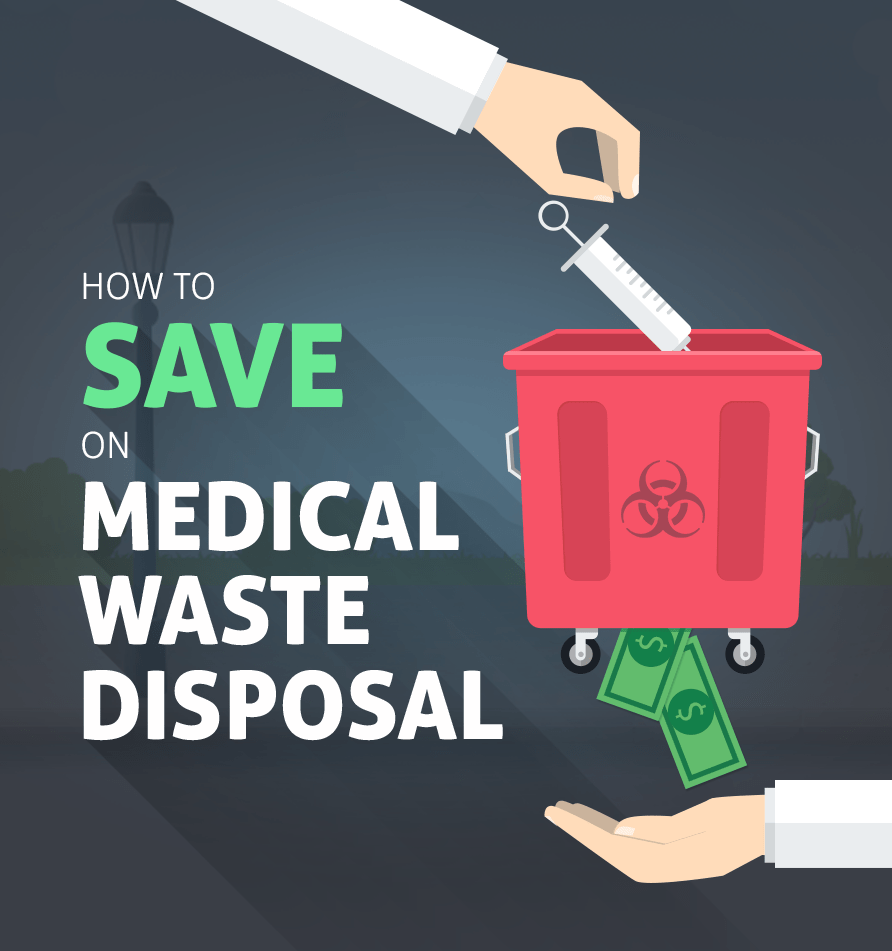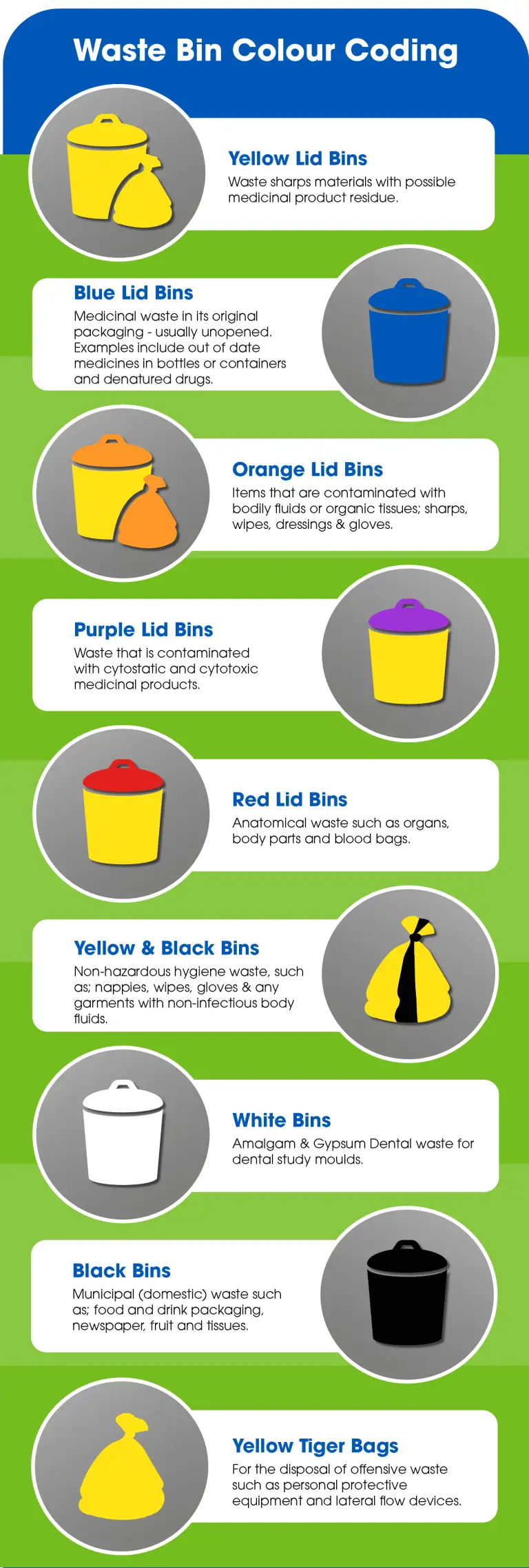Safe and Reliable Medical Waste Removal: Your Trusted Environmental Partner
Wiki Article
Compliance and Rules for Medical Waste Disposal
Conformity and laws for clinical waste disposal play a vital function in making sure the security and health of both medical care experts and the general public. Correct management of clinical waste is vital to stop the spread of infections, secure the environment, and maintain public health. These policies incorporate various aspects, consisting of the classification and partition of clinical waste, appropriate storage and dealing with procedures, as well as transportation and disposal approaches.Value of Compliance
The significance of compliance with guidelines for clinical garbage disposal can not be overemphasized. Proper disposal of clinical waste is vital for making sure the safety and health of healthcare employees, people, and the public. Medical waste, which consists of items such as used needles, contaminated handwear covers, and biomedical waste, can posture severe wellness threats if not dealt with and disposed of correctly.Compliance with regulations makes sure that clinical waste is managed in a means that decreases the possibility for direct exposure to dangerous compounds and infectious diseases - medical waste disposal service. It assists prevent the spread of infections, such as HIV, liver disease B and C, and various other bloodborne pathogens. Conformity likewise plays an essential duty in safeguarding the environment by preventing contamination of water resources, soil, and air
Failure to follow laws can result in extreme repercussions for healthcare centers, consisting of fines, legal action, and damages to their online reputation. Furthermore, non-compliance might compromise the health and wellness of medical care employees, clients, and the area.
Conformity with policies for clinical garbage disposal requires adherence to particular standards and procedures. These might include appropriate partition, product packaging, labeling, and storage space of medical waste. It additionally entails making use of accepted disposal approaches, such as landfilling, incineration, or autoclaving, depending upon the kind of waste.
Governing Agencies and Bodies
Governing agencies and bodies play a crucial duty in supervising conformity with policies for clinical waste disposal. These companies are in charge of setting guidelines, methods, and standards to guarantee the correct and risk-free handling of medical waste. They enforce and check conformity to shield public health and wellness and the atmosphere.Among the most prominent regulative companies in the USA is the Environmental Protection Agency (EPA) The EPA is accountable for managing the storage space, transportation, therapy, and disposal of medical waste. They establish standards for waste generators, carriers, and treatment facilities to adhere to, guaranteeing that all needed precautions are taken to prevent the spread of conditions and contamination.
An additional important governing body is the Occupational Safety And Security and Health Administration (OSHA) OSHA establishes standards and regulations to protect workers from work-related risks, consisting of those pertaining to clinical waste. WasteX Medical Waste Disposal. They supply guidelines for the risk-free handling and disposal of medical waste to secure workers in health care centers
In enhancement to these government companies, specific states additionally have their very own governing bodies that oversee clinical waste disposal. These firms may have their own details guidelines and requirements that must be complied with.

Classification and Partition of Medical Waste
To guarantee correct management of clinical waste, it is important to identify and segregate it according to established standards and procedures. medical waste disposal service. Classification and segregation play an important duty in decreasing the threat of infection, safeguarding the setting, and making certain the safety of healthcare workers and the general publicClinical waste is classified right into various categories based on its potential hazard degree. These classifications include transmittable waste, pathological waste, sharps waste, pharmaceutical waste, chemical waste, and radioactive waste. Each classification needs particular handling, storage, transport, and disposal approaches to minimize the threat of exposure and contamination.
Partition of clinical waste involves dividing various types of waste at the source. This procedure ensures that waste with various danger degrees is not mixed, minimizing the potential for cross-contamination and making disposal treatments extra efficient. Proper partition is accomplished with making use of color-coded tags and containers, which aid medical care workers and waste monitoring employees handle each type and identify of waste correctly.
In enhancement to category and segregation, medical care centers have to likewise stick to neighborhood, state, and federal guidelines pertaining to medical waste administration. These policies lay out specific needs for storage internet space, transport, treatment, and last disposal of medical waste, guaranteeing conformity and preserving public wellness and security.
Proper Storage Space and Handling Treatments
Proper storage space and handling procedures play a critical role in guaranteeing the certified and secure monitoring of clinical waste. Medical waste, that includes products such as used syringes, polluted gloves, and expired drugs, can position significant health and wellness and environmental risks if not managed properly. It is vital for healthcare centers and other generators of medical waste to implement rigorous storage space and handling methods.
To start with, clinical waste should be stored in durable, leak-proof containers that are specifically made for this function. These containers need to be identified with the universal biohazard sign and words "clinical waste" to plainly show the materials. In addition, the containers ought to be maintained securely near to stop any potential leakage or splilling.
Furthermore, it is crucial to set apart different kinds of clinical waste to prevent cross-contamination. Sharps, such as needles and scalpels, need to be saved in puncture-resistant containers to minimize the danger of injuries - WasteX Medical Waste Disposal. Chemical waste, such as anti-bacterials and solvents, need to be saved individually from other types of clinical waste to avoid chain reactions or harmful direct exposures

Transportation and Disposal Approaches
Health care facilities should guarantee the safe transport and correct disposal of their medical waste to abide by guidelines and protect public health. Transport and disposal methods play a vital role in protecting against the spread of infectious diseases and reducing the environmental influence of medical waste.
To transfer medical waste, medical care centers should utilize leak-proof and puncture-resistant containers that are labeled with the biohazard symbol. These containers ought to be firmly secured to avoid any type of leak throughout transport. In addition, health care centers must develop methods for the transport process, consisting of making use of qualified employees and dedicated vehicles.
Once the medical waste gets to the disposal center, it undergoes numerous approaches of therapy - WasteX Medical Waste Disposal. One usual approach is incineration, which includes burning the waste at high temperatures to damage virus and reduce the volume of waste.
It is necessary for health care facilities to function with licensed and allowed waste administration firms to guarantee appropriate transport and disposal of clinical waste. These business have the knowledge and resources to manage medical waste securely and in compliance with guidelines.
Conclusion
In verdict, compliance with laws for medical waste disposal is of utmost relevance to make certain public health and safety and security. Regulatory agencies and bodies play a crucial function in applying these regulations. Proper category and partition of clinical waste, as well as following ideal storage and handling treatments, are necessary to prevent contamination and the spread of illness. Appropriate transport and disposal methods need to be executed to lessen environmental influences. Generally, adherence to compliance and policies is necessary to properly handle clinical waste.Clinical waste, which consists of items such as made use of needles, polluted handwear covers, and biomedical waste, can posture severe health dangers if not managed and disposed of appropriately.
These classifications include infectious waste, pathological waste, sharps waste, pharmaceutical waste, chemical waste, and contaminated waste.Segregation of clinical waste entails dividing different types of waste at the resource. Correct partition is attained with the usage of color-coded containers and labels, which aid health care workers and waste administration workers determine and handle each type of waste properly.
Chemical waste, such as solvents and anti-bacterials, must be stored independently from various other kinds of medical waste to protect against unsafe direct exposures or chemical responses.
Report this wiki page